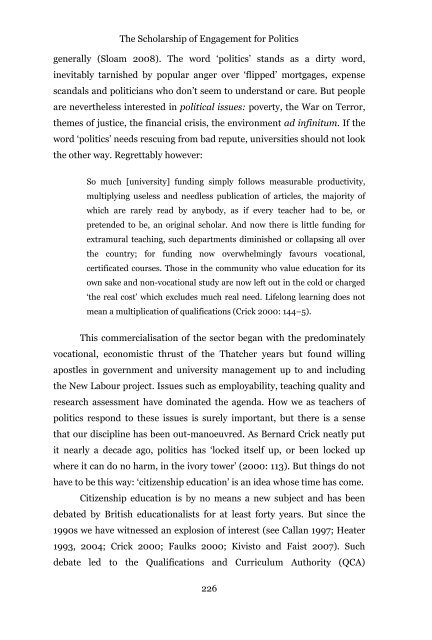The Scholarship of Engagement for Politics: - Higher Education ...
The Scholarship of Engagement for Politics: - Higher Education ...
The Scholarship of Engagement for Politics: - Higher Education ...
You also want an ePaper? Increase the reach of your titles
YUMPU automatically turns print PDFs into web optimized ePapers that Google loves.
<strong>The</strong> <strong>Scholarship</strong> <strong>of</strong> <strong>Engagement</strong> <strong>for</strong> <strong>Politics</strong><br />
generally (Sloam 2008). <strong>The</strong> word ‘politics’ stands as a dirty word,<br />
inevitably tarnished by popular anger over ‘flipped’ mortgages, expense<br />
scandals and politicians who don’t seem to understand or care. But people<br />
are nevertheless interested in political issues: poverty, the War on Terror,<br />
themes <strong>of</strong> justice, the financial crisis, the environment ad infinitum. If the<br />
word ‘politics’ needs rescuing from bad repute, universities should not look<br />
the other way. Regrettably however:<br />
So much [university] funding simply follows measurable productivity,<br />
multiplying useless and needless publication <strong>of</strong> articles, the majority <strong>of</strong><br />
which are rarely read by anybody, as if every teacher had to be, or<br />
pretended to be, an original scholar. And now there is little funding <strong>for</strong><br />
extramural teaching, such departments diminished or collapsing all over<br />
the country; <strong>for</strong> funding now overwhelmingly favours vocational,<br />
certificated courses. Those in the community who value education <strong>for</strong> its<br />
own sake and non-vocational study are now left out in the cold or charged<br />
‘the real cost’ which excludes much real need. Lifelong learning does not<br />
mean a multiplication <strong>of</strong> qualifications (Crick 2000: 144–5).<br />
This commercialisation <strong>of</strong> the sector began with the predominately<br />
vocational, economistic thrust <strong>of</strong> the Thatcher years but found willing<br />
apostles in government and university management up to and including<br />
the New Labour project. Issues such as employability, teaching quality and<br />
research assessment have dominated the agenda. How we as teachers <strong>of</strong><br />
politics respond to these issues is surely important, but there is a sense<br />
that our discipline has been out-manoeuvred. As Bernard Crick neatly put<br />
it nearly a decade ago, politics has ‘locked itself up, or been locked up<br />
where it can do no harm, in the ivory tower’ (2000: 113). But things do not<br />
have to be this way: ‘citizenship education’ is an idea whose time has come.<br />
Citizenship education is by no means a new subject and has been<br />
debated by British educationalists <strong>for</strong> at least <strong>for</strong>ty years. But since the<br />
1990s we have witnessed an explosion <strong>of</strong> interest (see Callan 1997; Heater<br />
1993, 2004; Crick 2000; Faulks 2000; Kivisto and Faist 2007). Such<br />
debate led to the Qualifications and Curriculum Authority (QCA)<br />
226
















